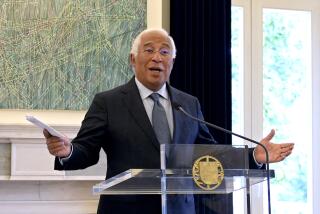Brazil Picks New Finance Minister : Proponents of Public Spending Take Over in Shake-Up
- Share via
RIO DE JANEIRO — Dilson Domingos Funaro, a Sao Paulo businessman with close personal ties to President Jose Sarney, took over Tuesday as Brazil’s minister of finance in a shake-up of the nation’s economic policy team.
In the first Cabinet crisis since Sarney took office in March--stepping in for the critically ill president-elect, Tancredo Neves--the proponents of fiscal austerity and strict monetary controls, led by Francisco Dornelles as finance minister, were swept out of office.
Neves, a fiscal conservative, appointed Dornelles, his nephew and a tax expert, to head the economic policy team, which included Antonio Carlos Lemgruber as president of the central bank.
With the removal of this group, the proponents of expansionary public spending and credit programs, led by Minister of Planning Joao Sayad and Paulo Luis Rosemberg, the president’s personal economic adviser, have been given full control.
Foreign bankers said the changes will make it more difficult for Brazil, the Third World’s largest debtor nation, to negotiate a stabilization agreement with the International Monetary Fund and persuade foreign creditors to refinance Brazil’s $100-billion foreign debt.
But many Brazilian bankers and businessman agreed that the choice of Funaro, who has been president of the state’s National Development Bank since March, will bring greater harmony to economic policy within the government.
Stock markets here and in Sao Paulo, where prices declined sharply Monday on news of Dornelles’ resignation, rebounded Tuesday with the appointment of Funaro, who is known as a proponent of economic growth led by private enterprise. Funaro, 52, is the owner of a plastics company in Sao Paulo and worked in the state government there.
Funaro quickly announced that Lemgruber’s replacement as president of the Central Bank would be Fernao Bracher, 50, director of international operations for Brazil’s largest private bank, Bradesco, and another Sao Paulo native.
At a swearing-in ceremony in Brasilia, the national capital, Funaro said he will try to maintain Brazil’s current economic expansion while cutting down inflation by reducing interest rates, a major demand of businessmen, and putting a brake on state deficits.
Bracher appears also to favor expansion. At a news conference Tuesday, he said the country had made enough sacrifices in recent years.
“The years 1983 and 1984 were ones of very tough sacrifices for the country,” Bracher said. “It is time to reap the fruits of those sacrifices.”
An American banker here said it appears that Sarney is taking the same road that President Raul Alfonsin followed in Argentina during his first year. There, policies to stimulate the economy led to inflation of 1,000% a year before policy was reversed to halt the monetary slide.
Until now, expansionary monetary and wage policies under Sarney have contributed to a strong economic upturn, with the gross national product rising at an annual rate of 5%. Unemployment is down and price increases have been restrained by controls on the cost of basic foods and public services.
Rising Public Deficits
This growth has been accompanied by rising public deficits, which are estimated at $16 billion this year. The deficits are being financed by government borrowing and the printing of more currency, and inflation has begun to rise, from 8% a month between April and June to 12% this month.
Opposed by Sayad and Rosemberg, Dornelles was not able to impose heavy cuts on spending by state enterprises. By dumping Dornelles, Sarney reaffirmed his priority for growth and spending on social programs--rural feeding in depressed areas like the drought-ridden northeast, for example--over a decisive attack on inflation.
Negotiations Postponed
This led to serious disagreement with the IMF, which for months has been negotiating with Brazil on a new stabilization program.
Creditor foreign banks have been postponing negotiations on a 15-year refinancing of the $45 billion in debt due between this year and 1991 until the IMF approves Brazil’s financial plans.
Dornelles obtained a recommendation to the banks from the IMF for a new deferral of payments on principal.
Because of a $12-billion trade surplus, Brazil is up to date on interest payments on the foreign debt, payments that will amount to more than $11 billion this year.
But refinancing the debt is considered essential for Brazil to meet its growth goal of 5% to 6% a year over the next three years.
More to Read
Sign up for Essential California
The most important California stories and recommendations in your inbox every morning.
You may occasionally receive promotional content from the Los Angeles Times.













